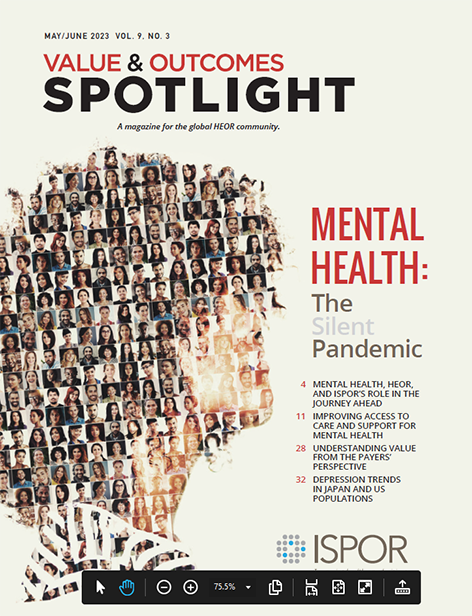HEOR News
 ChatGPT: Not An Author, But A Tool (Health Affairs)
ChatGPT: Not An Author, But A Tool (Health Affairs)
As a tool, ChatGPT does have a place in medical publishing—for example, revising a draft that can be more adherent to reporting guidelines, or by helping investigators not fluent in English prepare manuscripts for publication, possibly increasing the likelihood of acceptance.
Read more
 How Is the Cost-of-Living Crisis Affecting Public Health? (Economics Observatory)
How Is the Cost-of-Living Crisis Affecting Public Health? (Economics Observatory)
With various factors (inflation, post-COVID manufacturer markups, and the Russian war in Ukraine) making food and energy unaffordable in the United Kingdom and in low- and middle-income countries, the outlook for health is worrying and may worsen if the cost-of-living crisis continues.
 PBMs and Pharma Play Blame Game Over Drug Pricing at Hearing (Fierce Pharma)
PBMs and Pharma Play Blame Game Over Drug Pricing at Hearing (Fierce Pharma)
It was the same story from the heads of 3 pharma companies and 3 PBMs during the Senate Health, Education, Labor and Pensions (HELP) Committee’s hearing on legislation on pricing transparency for pharmaceuticals, as each side blamed the other for higher drug costs.
 Economic Effects of Healthy Aging: Functional Limitation, Forgone Wages, and Medical and Long-Term Care Costs (Health Economics Review)
Economic Effects of Healthy Aging: Functional Limitation, Forgone Wages, and Medical and Long-Term Care Costs (Health Economics Review)
Researchers say health interventions for middle-aged and older people can yield economic benefits by preventing exits from the labor market due to health issues and reducing medical and long-term care costs.
 Hundreds of Children With Type 2 Diabetes to Be Offered Choice of 2 Life-Changing Technologies (NICE)
Hundreds of Children With Type 2 Diabetes to Be Offered Choice of 2 Life-Changing Technologies (NICE)
NICE is recommending the use of real-time continuous glucose monitoring (rtCGM) or intermittently scanned glucose monitoring (isCGM) devices for some children living with type 2 diabetes who are currently using finger prick testing and insulin therapy, giving them less-invasive ways of managing their condition.
 To Eliminate HCV Among Persons Who Use Drugs: Embrace the Complexity (Health Affairs Forefront)
To Eliminate HCV Among Persons Who Use Drugs: Embrace the Complexity (Health Affairs Forefront)
To effectively treat injectable drug users with hepatitis C virus (HCV), it will take more than the White House’s plan to treat HCV in the United States by increasing access to direct-acting antiviral agents. Effectively caring for injectable drug users requires an awareness of the internal and external factors (such as unstable housing, incarceration, and shame due to the stigma of drug use) that can influence their willingness to both initiate and complete HCV treatment.
 RWE Shows Efficacy of Nirsevimab for Infant RSV (European Pharmaceutical Review)
RWE Shows Efficacy of Nirsevimab for Infant RSV (European Pharmaceutical Review)
The monoclonal antibody nirsevimab may prevent moderate-to-severe respiratory syncytial virus disease in infants after a single dose, according to new real-world data from the phase IIIb trial.
 WHO Advises Not to Use Nonsugar Sweeteners for Weight Control in Newly Released Guideline
WHO Advises Not to Use Nonsugar Sweeteners for Weight Control in Newly Released Guideline
The findings of a systematic review of the available evidence suggests that the use of nonsugar sweeteners do not confer any long-term benefit in reducing body fat in adults or children, and the long-term use of nonsugar sweeteners may have potential undesirable effects, such as an increased risk of type 2 diabetes, cardiovascular diseases, and mortality in adults.
 Education and Medication Use Later in Life and the Role of Intelligence (The European Journal of Health Economics)
Education and Medication Use Later in Life and the Role of Intelligence (The European Journal of Health Economics)
Researchers found a strong effect of education on prescribed medications for most medications, except for prescribed medication for cardiac diseases and for depression and anxiety.
 Sierra Leone Launches Review to Reinforce Health Emergency Readiness, Response (WHO)
Sierra Leone Launches Review to Reinforce Health Emergency Readiness, Response (WHO)
Sierra Leone has become the second African country, and the fifth globally, to launch a review of its health emergency preparedness and response capacity to identify gaps and reinforce measures against health shocks, with priorities in 3 areas of the health response: governance, systems and financing for health emergencies, and universal health coverage.

